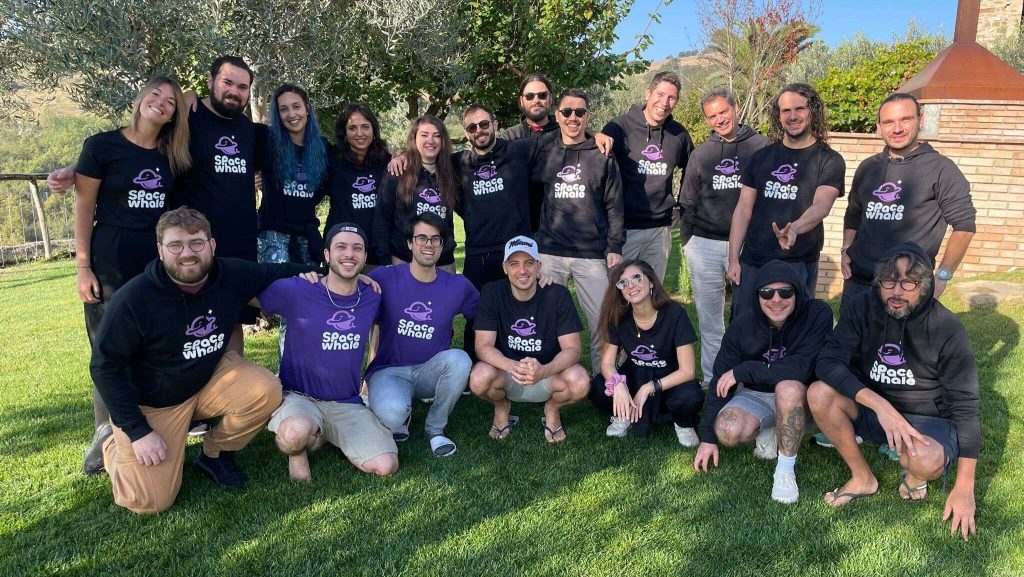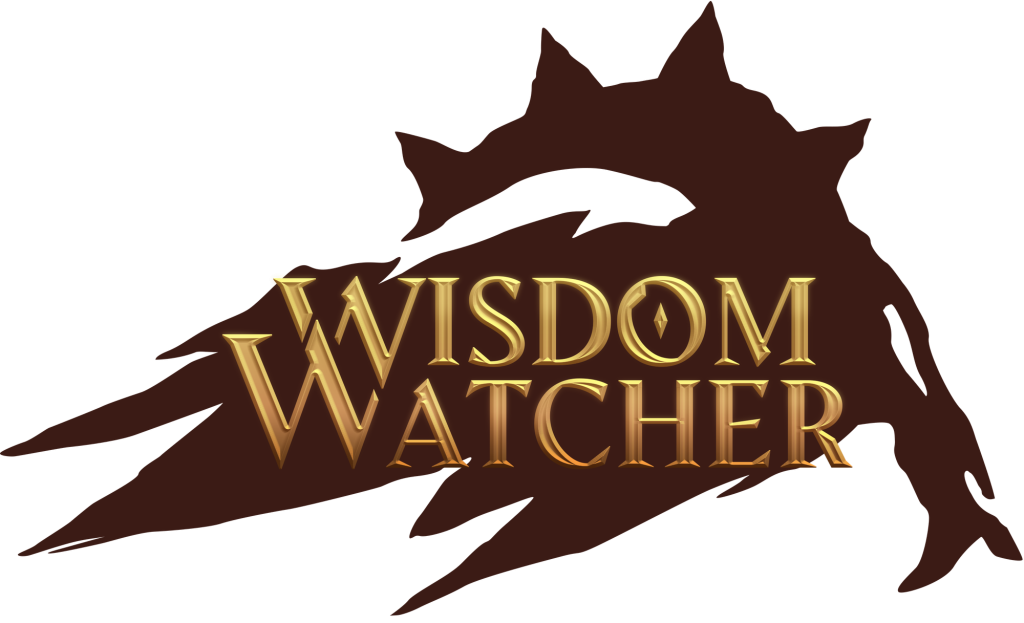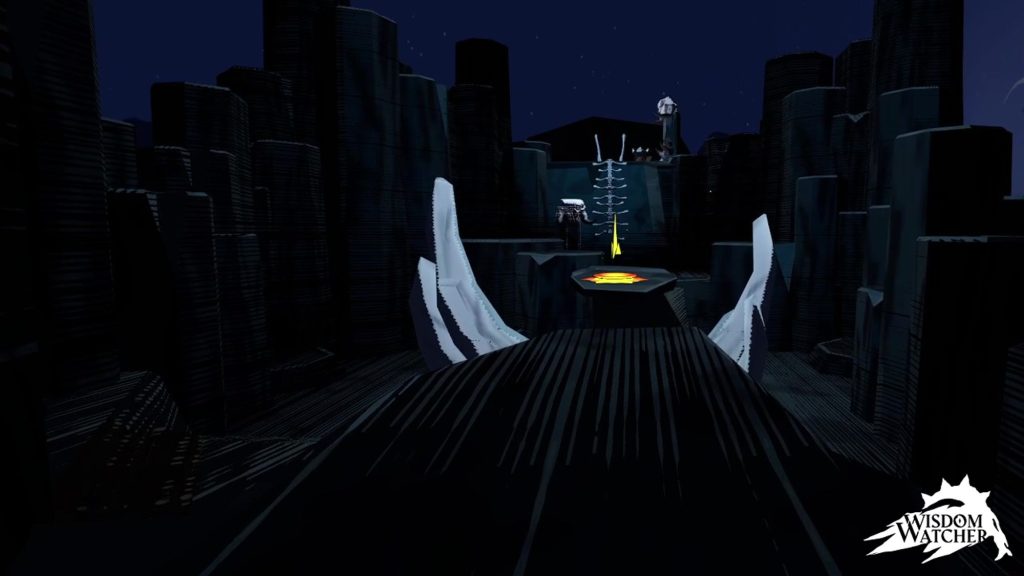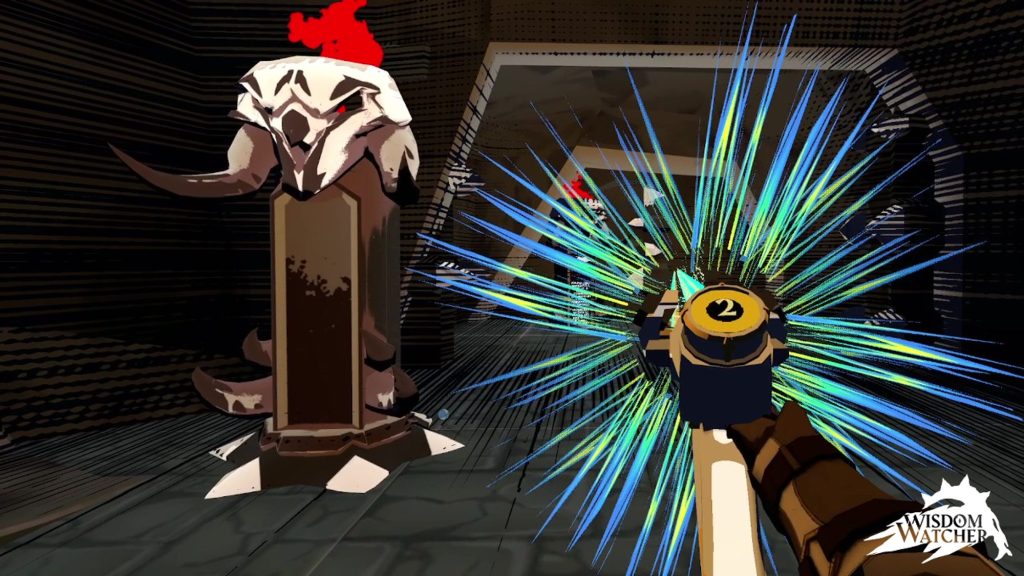In the gaming industry, a lot of attention is pointed toward studios with massive multi-million dollar budgets. The AAA titles that come from these developers can be exciting and cinematic, but there is often a hesitance to push the boundaries and create something new. While these games certainly have their place, it is the independent developers of the world who continue to work towards advancement.
There is a lot of information available about big studios in the media, but not as much about the daily life of indie developers. Thankfully, FandomWire was able to connect with Space Whale, an Italian indie studio that specializes in virtual reality.
Marius, the Project Manager & Tech Leader and Fabio, the Marketing Manager, took time to answer our questions and discuss what it means to work for an indie studio like Space Whale. They also provided details on the studio’s first game, Wisdom Watcher, and what users can expect from the title.
What is Space Whale and how did the video game studio get started?
Fabio: Space Whale is an Italian indie game studio specializing in multiplatform game development. Our roots stem from the expertise of Digital Mosaik, an agency renowned for crafting immersive experiences and virtual worlds, with a particular focus on Virtual Reality (VR) and Augmented Reality (AR). Space Whale was created to build on that expertise and to expand it in the gaming world and the games we’re planning to develop won’t be limited to the VR/AR environment. The team is composed of international developers and artists (many of them are part of Digital Mosaik’s team as well) who share a passion for the gaming world and are experienced in designing and developing video games. The first video game that we are going to release is called Wisdom Watcher, it is a VR arena shooter set in a clockpunk universe, inspired by European folklore and legends.
What does it mean to be an indie developer in the world of VR, especially compared to any other medium in the gaming industry?
Fabio: The journey is both thrilling and challenging! While VR gaming is nascent compared to traditional platforms, it presents abundant opportunities and inherent challenges. Of course we’re talking about a niche at the moment, but the interest around it is growing by the day and it will keep growing as the devices and technologies behind them get better, expanding its reach and getting more and more players into it. We’re also talking about a specific kind of target that for the most part is looking for specific kind of games, so you have to keep this in mind when you’re developing a VR game if you want to appeal to a larger audience.
Can you describe a day in the life of an indie developer and how you focus your time?

Maris: At Space Whale, we operate as a remote indie game development team, utilizing Discord as our primary means of communication and collaboration. Our typical day begins with a review of the work accomplished the previous day. Throughout the day, we maintain close contact, sharing our progress and brainstorming ways to enhance our projects.
Collaboration is at the heart of what we do, and this continuous exchange ensures that we remain aligned on project goals and fosters a sense of unity among our team members, despite the physical distance.
In addition to our project-focused activities, we prioritize ongoing learning and skill development. Each week, we allocate dedicated hours for learning and research, where team members can explore new techniques and software to expand their knowledge. We find that this investment often results in direct improvements to our active projects, bringing fresh ideas and approaches to the table.
In the evenings, some of us come together to play the latest games, both for enjoyment and educational purposes. This gaming session serves as a fun way to unwind and bond as a team, while also allowing us to study and learn from other game designs and mechanics, contributing to our own game development expertise.
Our daily routine is designed to be collaborative, adaptive, and growth-oriented, ensuring that we remain innovative and committed to delivering high-quality indie games to our audience.
Is it important for more indie developers to enter the market?
Fabio: Absolutely! The indie realm is a breeding ground for innovative ideas and pioneering experiments, so it is always exciting to see a new developer entering this world and bringing something new and interesting to the table, be it a new gameplay approach, new mechanics or something else. When we talk about AAA titles that have millions of dollars of investments behind them, they obviously tend to have a more cautious approach, they cannot risk to experiment with disruptive ideas, they’re forced to play it safe. This doesn’t apply to indie developers, or at least not to the same extent, so having more indie developers is not only inspiring, but it also helps to push the limits and expand boundaries of the gaming world. And with Space Whale we’re trying to bring something new to the table, by putting our passions and ideas into our games and trying to add something personal and new in what we develop.
Do you feel there’s an advantage to being a smaller developer in the industry, or does your team face many of the same challenges as larger studios?
Fabio: Like any endeavor, there are pros and cons. Our compact size grants us agility and adaptability, both in terms of what and how we want to develop, as we mentioned before, and in terms of the reaction time we can put in place when a problem arises: we don’t have to get through lots of people and approvals and we can act fast and change things rapidly. Of course we face many challenges; being a new studio that nobody has ever heard about means that we have to put a lot of effort in getting our games and our name out there and getting players and media to listen to us, try out our games and learn to trust us. Also, larger studios tend to have obviously larger budgets to spend both in development and in marketing, while being smaller means that we have to make ends meet and try to get the best out of what we have by being creative.
Then of course, in the end all studios, no matter their size, we have one common goal, which is to develop a successful game that players appreciate, so from that point of view there’s not much difference.
What is the process of VR development, from the early stages to the end result?

Marius: The process of VR development at Space Whale, from the initial stages to the final result, involves several key steps. It all begins with a thorough understanding of our target audience and their needs. Before embarking on a new project, we conduct in-depth research to identify user preferences and requirements, ensuring that our VR experiences are tailored to their expectations.
A critical advantage we have in our VR development process is the utilization of tools we’ve developed in previous VR projects. This allows us to significantly reduce development timelines, as we can leverage and adapt these tools to suit the unique requirements of each new project.
Throughout the development cycle, we seamlessly transition between phases of research, development, and performance testing. We understand that VR development presents unique challenges, primarily due to the complexities of virtual reality environments. As a result, rigorous testing and optimization become integral aspects of our process.
At key milestones in the project, we conduct internal releases. This step is crucial, as it allows our team to collect feedback from all members and identify any issues or bugs that need addressing. This iterative approach ensures that we remain aligned and that the project continually evolves based on the insights and expertise of the entire team.
Developing VR experiences is more intricate than traditional development, mainly because of the extended testing phases and the added complexity of debugging within a VR environment. VR requires meticulous attention to detail, as the user’s immersion and comfort are paramount. This, in turn, makes thorough testing and debugging in VR an essential aspect of our development process.
In the end, the Space Whale team is dedicated to delivering high-quality VR experiences that captivate and engage our audience, and our development process reflects our commitment to excellence in the world of virtual reality.
How did Space Whale evolve from the experience of Digital Mosaik and is there any plan to work on AR projects in addition to VR games?
Marius: Space Whale has been an exciting evolution from our previous experience at Digital Mosaik. We’ve brought with us the knowledge and expertise gained from our work at Digital Mosaik, and this has proven to be an invaluable asset in our journey. Many of the team members at Space Whale are passionate gamers, and the transition from players to developers has been a thrilling and fulfilling experience for all of us.
While we are keeping a close eye on the developments in the field of Augmented Reality (AR), as of now, we don’t have any AR projects currently in development. However, our background and experience in game development has equipped us with the skills and adaptability to explore AR projects in the future, should opportunities arise.
Our journey from Digital Mosaik to Space Whale has allowed us to build upon our prior experiences and continue to pursue our passion for game development, and we remain open to new possibilities and technologies in the gaming world.
What is the trajectory for Space Whale and where do you see the studio ten years from now?
Fabio: Our ambition is to continually craft and launch diverse games across various platforms, but simultaneously, we’re committed to enriching our existing titles and adding content to the games we publish! As for Wisdom Watcher for example, we already have plans for adding content for at least the next couple of years, so that the game can keep evolving, while getting new players (and giving the old ones reasons to keep playing it). We’re also looking to build a strong community around our games and our studio; we want to build a strong relationship with the players that like our games and we want to keep developing by listening to what they have to say and what they’d like to see in them. It’s a kind of approach that we are already experimenting with Wisdom Watcher – our community has already given lots of useful and interesting feedback that helped us a lot. And of course anyone that wants to join the community and give feedback is welcome, just join our Discord server (https://discord.com/invite/S2fqJYGGDg)! 🙂
There are currently 15 people on your team. How many employees would be enough to fulfill the goals of Space Whale?
Marius: Our team has seen significant growth over the past six months, expanding to a total of 15 members. While we have reached a substantial team size, it’s important to note that our goals and requirements are continuously evolving. At this stage, we believe that our current team composition is adequate to fulfill the goals of Space Whale.
However, it’s essential to recognize that effective team integration and assimilation of new talent is an ongoing process. As we continue to refine our projects and explore new opportunities, we’ll assess our staffing needs to ensure we have the right balance of skills and expertise to meet our objectives.
How long will it take you to develop a game in VR, compared to one of the larger video game companies?

Marius: The development timeline for a VR game at Space Whale varies depending on the type and complexity of the game. Indie game development typically involves a more focused approach, often centering on a specific game mechanic or concept. Given that we don’t have the budgets and resources of larger video game companies, we face the challenge of creating compelling and engaging VR games within shorter development timelines.
Compared to larger video game companies, the development time for our VR games is generally shorter. Large studios often work on expansive projects with extensive features and content, which can extend development timelines over several years. In contrast, as indie developers, we aim to create experiences that are rich in innovation and creativity while maintaining a more streamlined development process.
Can you describe Wisdom Watcher and what players should expect?
Fabio: Delighted to! Wisdom Watcher is an immersive VR FPS arena based game, deeply rooted in a clockpunk realm inspired by European tales and traditions. There will be several different arenas with different gameplay modes available that players can choose from – each new arena will introduce a new gameplay mode that can be played also in the arenas already released. Each arena will have a different set-up and will provide different challenges – each one is a ‘living’ environment which evolves constantly, with monsters that exhibit social behaviours, undertake tasks, form alliances and modify the surroundings (by creating traps, for example). There’s a variety of weapons available, from melee to firearms, each one with specific characteristics (damage, recoil, cadence etc) which will give players the possibility to choose the best strategy for every challenge. Firearms need mana to work and by killing monsters and extracting their lifeblood you can recharge them. Moreover, players can explore the arenas and discover items, weapons and cards dropped by monsters: (ATTENTION, BIG SPOILER ALERT! 😀) we’re actually working on a new system where cards will be very useful in combat and players will be able to use them in different ways while fighting in the arenas.
Last but not least, by accumulating points in the arena players can enter the daily, monthly and seasonal leaderboards of the game, with exclusive rewards for those who are able to climb to the top!
Which platforms and headsets will gamers be able to use in order to play Wisdom Watcher?
Fabio: Wisdom Watcher is primarily designed for standalone VR, but is fully compatible with PCVR. If you’re used to playing on standalone you’ll notice that it is extremely well optimized in terms of performance: you can fight hordes of 20+ monsters simultaneously for example and experience a unique real-time in-game lighting that we are now implementing across the board.
What did the creation process look like when developing Wisdom Watcher and how long have you been working on this project?

Marius: The creation process for Wisdom Watcher has been a significant undertaking for us at Space Whale. As our first major project, it required extensive brainstorming and creative exploration to define the type of game we wanted to create. We went through multiple phases of idea generation and refinement to ensure that the game concept aligned with both our vision and the evolving needs of the market. This often involved taking steps back to approach development with a more open mindset and adapt to changing circumstances.
Wisdom Watcher has been in development for a little over a year. During this time, our team has worked diligently to bring this project to life, leveraging our collective knowledge and experience to create a unique and engaging VR game. We’re excited about the progress we’ve made, and we look forward to sharing our creation with the gaming community.
How can fans get access to the demo version of the game and when do you expect a full release?
Fabio: Currently, the demo is accessible on Steam, Oculus AppLab, and we’re in the process of including it in the Pico Store. We’re aiming to release the game on early access in the next few weeks, with some new features and content available – the goal is to get more feedback from players in order to refine it and then have a full release available next year. But as we mentioned before, we’ll keep adding content and expanding the game after release.
Although it might be well into the future, do you have any ideas on what kind of games you would like to make after Wisdom Watcher is complete?
Fabio: Indeed, we do! We have several exciting projects in the pipeline. ‘Ars Bellica’ is one, blending combat, exploration, and puzzles in a futuristic cyberpunk setting with classic anime graphics. The second one is called Pinball For Two (P42) and is an arcade VR competitive multiplayer 1-on-1 video game, you can think of it as a sort of tennis or paddle which includes weapons and other skills that can be used. But of course, our main focus right now is Wisdom Watcher.
Is there anything else you would like to say about working as an indie developer that you would like to share with readers?
Fabio: A parting thought: Passion fuels every indie developer. This dedication translates into relentless effort to craft games that captivate and enthrall players. Thus, we urge everyone to extend their support and kindness to indie developers!
Follow us for more entertainment coverage on Facebook, Twitter, Instagram, and YouTube.

